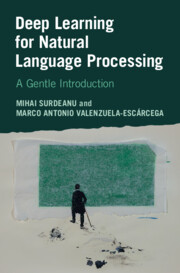Book contents
- Frontmatter
- Contents
- List of Figures
- List of Tables
- Preface
- 1 Introduction
- 2 The Perceptron
- 3 Logistic Regression
- 4 Implementing Text Classification Using Perceptron and Logistic Regression
- 5 Feed-Forward Neural Networks
- 6 Best Practices in Deep Learning
- 7 Implementing Text Classification with Feed-Forward Networks
- 8 Distributional Hypothesis and Representation Learning
- 9 Implementing Text Classification Using Word Embeddings
- 10 Recurrent Neural Networks
- 11 Implementing Part-of-Speech Tagging Using Recurrent Neural Networks
- 12 Contextualized Embeddings and Transformer Networks
- 13 Using Transformers with the Hugging Face Library
- 14 Encoder-Decoder Methods
- 15 Implementing Encoder-Decoder Methods
- 16 Neural Architectures for Natural Language Processing Applications
- Appendix A Overview of the Python Language and Key Libraries
- Appendix B Character Encodings: ASCII and Unicode
- References
- Index
8 - Distributional Hypothesis and Representation Learning
Published online by Cambridge University Press: 01 February 2024
- Frontmatter
- Contents
- List of Figures
- List of Tables
- Preface
- 1 Introduction
- 2 The Perceptron
- 3 Logistic Regression
- 4 Implementing Text Classification Using Perceptron and Logistic Regression
- 5 Feed-Forward Neural Networks
- 6 Best Practices in Deep Learning
- 7 Implementing Text Classification with Feed-Forward Networks
- 8 Distributional Hypothesis and Representation Learning
- 9 Implementing Text Classification Using Word Embeddings
- 10 Recurrent Neural Networks
- 11 Implementing Part-of-Speech Tagging Using Recurrent Neural Networks
- 12 Contextualized Embeddings and Transformer Networks
- 13 Using Transformers with the Hugging Face Library
- 14 Encoder-Decoder Methods
- 15 Implementing Encoder-Decoder Methods
- 16 Neural Architectures for Natural Language Processing Applications
- Appendix A Overview of the Python Language and Key Libraries
- Appendix B Character Encodings: ASCII and Unicode
- References
- Index
Summary
All the algorithms we covered so far rely on handcrafted features that must be designed and implemented by the machine learning developer. This is problematic for two reasons. First, designing such features can be a complicated endeavor. Second, most words in any language tend to be very infrequent. In our context, this means that most words are very sparse, and our text classification algorithm trained on word-occurrence features may generalize poorly. For example, if the training data for a review classification dataset contains the word great but not the word fantastic, a learning algorithm trained on these data will not be able to properly handle reviews containing the latter word, even though there is a clear semantic similarity between the two. In this chapter, we will begin to addresses this limitation. In particular, we will discuss methods that learn numerical representations of words that capture some semantic knowledge. Under these representations, similar words such as great and fantastic will have similar forms, which will improve the generalization capability of our machine learning algorithms.
- Type
- Chapter
- Information
- Deep Learning for Natural Language ProcessingA Gentle Introduction, pp. 117 - 131Publisher: Cambridge University PressPrint publication year: 2024



